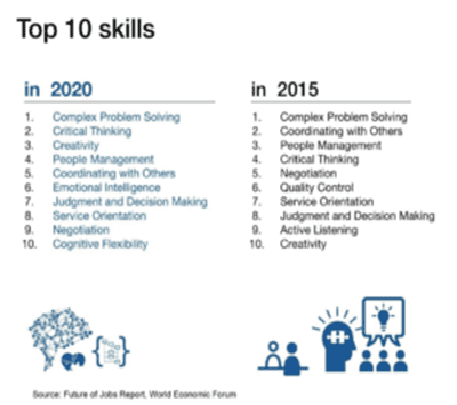By Tony Devine, Managing Partner, The Grey Matters Network
It may sound strange but when we speak about the ‘future of work’ we’re not talking about something that’s light years away: we are, in fact, talking about the present.
Yes, that’s right: the ‘future of work’ is not something that only future generations need to worry about, it’s something that’s happening right now.
The ‘future of work’ can be seen all around you, in various forms and work practices: co-working, virtual offices, mobile working 24-7, smart tech, collaboration, full-employment, bots and automation, and – very significantly – skills shortages.
However, that’s not all: it’s also very evident in workplace demographics since – for the first time in history – 5 different generations are active in the workplace simultaneously.
But why is this?
Well, a number of different factors are at play; for example, a continuing spike in demand for goods and services, an increase in consumption, ever-increasing globalisation, and the constant evolution of technology – including its impact on work practices and processes.
On top of this, we are witnessing a huge increase in new types of work, including large numbers of specialist high-tech jobs – many of which didn’t even exist a decade ago.
These are some of the main reasons why more people, with extremely diverse capabilities and skill sets, are needed in the workplace now, than at any other time in history.
While this undeniably presents challenges to businesses and economies, it’s also an incredible opportunity for the ‘Greyennial’ to use their vast experience to guide companies through growth challenges – and draw on their vast expertise, knowledge, and life experiences to help younger people become more successful in their careers.
From being ‘washed- up’ to becoming ‘much-needed.’
Within the space of a decade, we have moved to a position where the notion that someone could be deemed obsolete or ‘surplus to requirements’ – just because they reach a certain age and tick a certain box – is almost unfathomable.
For generations, the social etiquette of ‘respecting your elders’, was a value that was taught in every Irish school as a matter of course.
However, for whatever reason, this was something that applied to adult-child relationships and rarely extended to the workplace – where getting older often meant being old-school or out of touch.
Fortunately, this attitude is something that has changed quite dramatically over the past decade or so, for the following four reasons:
- We’re living longer
It’s now believed that 50% of people born today will live to 100. Or, as Chip Conley (renowned American entrepreneur, author, and passionate speaker on the subject of the modern workplace elder), points out, because many of us will live well into our 90s, when we reach the age of 55, many of us will still have more than half of our life ahead of us.
As a result, the question we need to ask is this: can any economy afford to support this cohort for 35 years, following a working life of 40/45 years?
- Employment and demand for labour in the market are now at an all-time high
Because Ireland has over 2.3m people at work and is approaching ‘full employment,’ the simple, inescapable, economic reality is that we need as many people as possible working, to keep the wheels of the economy turning. In other words, we can no longer afford to use age as a barrier and must instead use the more sensible logic that if you’re good enough, you’re young enough!
- With the rise of technology, robots, and a younger workforce, experience is a more valuable resource than ever
While robots and intelligent machines are increasingly carrying out many everyday tasks that were once the preserve of people, softer business functions such as business strategy, leadership, or management, or ones that are outside their remit. The Future of Jobs report from the World Economic Forum reflects this thinking.

- There’s an increasing acceptance that Emotional Intelligence is something that comes with age
Chip Conley, a successful US businessman, motivational speaker, and renowned authority on the subject of ‘the modern elder’, believes that emotional intelligence is a skill that comes with age as a result of real-life experiences; in other words, it’s an acquired rather than a learned skill and is something that can perfectly complement the digital skills of younger employees.
Essentially, the central point is that there’s no longer the time nor the money to allow for ageism in the workplace; unlike in previous eras where every employee came with a ‘best before date’ (determined by nothing other than the year of their birth), companies have finally come to the realisation that age really is nothing but a number.
Increasingly, businesses are recognising and appreciating the value of having employees from all age demographics, in terms of diversity, knowledge, and even customer engagement.
But why so?
Well, there’s no doubting the fact is that younger people are the ones with the digital and technical skills needed to develop the next big widget ahead of their competitors, or that robots / AI / AR are in their infancy and will continue to take over many roles currently undertaken by people.
However, what has also become obvious is that experience (that intangible attribute that’s responsible for delivering ‘emotional intelligence)’ is something that can never be taught at university; it’s a life skill that’s learned from many years spent at the coalface of business.
But don’t just take it from us, look at the latest figures which speak for themselves: according to the CSO, almost 60,000 people aged 65 and over were listed as working in Ireland in 2016, (+33% on 2011) – and more than 1,100 of these aged 85 (yes, eighty-five!) and over.
Finally, the 2016 Irish census tells us that in the last five years, the population above 65 increased by 19% while the population under five fell by 7%; in other words, if we don’t tap into this growing resource pool, the cost to the country, in terms of healthcare services and pension payments, will be enormous.
So, don’t be under any illusions: in this era of rapid scaling, instant growth, technical innovation, and digital everything, the reality is that companies need us wise grey-haired purveyors of wisdom, more than ever before.
In the wise words of Chip Conley, “Think of mid-life not as a crisis but as an awakening.”
About
Email: [email protected]
Phone: +353 (01) 5461117









































